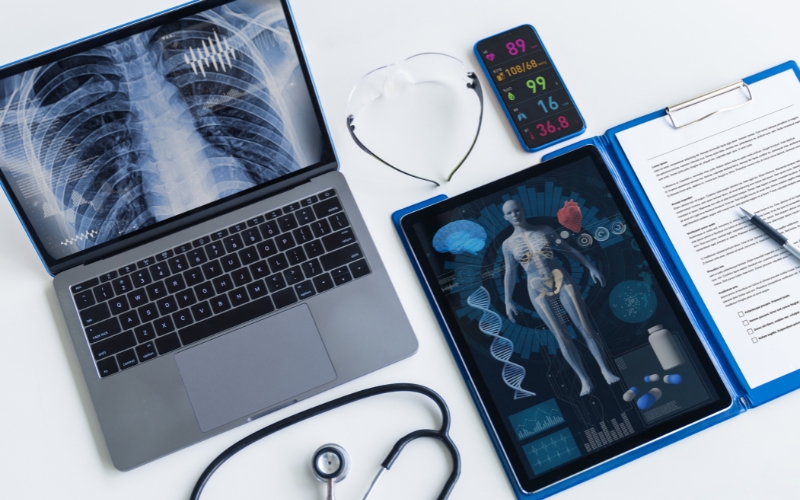- The Changing Landscape of the Medical Devices Industry
- The Limitations of Relying Solely on Technical Skills
- Why Leadership Experience in Medical Devices Industry Drives Success
- The Competitive Advantage of Leadership in the Medical Devices Industry
- Striking the Right Balance: Leadership and Technical Expertise
- Conclusion
The medical devices industry is evolving rapidly, requiring companies to balance technical expertise with strong leadership. While technical skills are essential for product development and regulatory compliance, leadership plays a more significant role in driving innovation, strategic decision-making, and long-term success. Professionals with Leadership Experience in Medical Devices possess the ability to navigate complex industry challenges, foster collaboration, and ensure sustainable growth. This article explores why leadership experience holds more value than technical skills in shaping the future of the medical devices industry.
The Changing Landscape of the Medical Devices Industry

The medical devices industry is evolving rapidly, driven by technological advancements, stringent regulatory requirements, and increasing market competition. Companies operating in this space must adapt to these changes while ensuring compliance, innovation, and patient safety. In such a dynamic environment, Leadership Experience in Medical Devices plays a crucial role in guiding organizations through these complexities. Leaders with strong experience can make strategic decisions that align with regulatory standards, market demands, and technological innovations.
Regulatory challenges are a constant in the medical devices sector, with agencies like the FDA and EMA enforcing strict compliance measures. A company’s ability to navigate these regulations effectively depends largely on its leadership. Executives with Leadership Experience in Medical Devices understand the importance of balancing compliance with innovation. They ensure that product development, testing, and commercialization strategies align with legal requirements without hindering progress.
Beyond regulatory concerns, the industry is witnessing a surge in artificial intelligence, robotics, and personalized medical solutions. While technical expertise is necessary for product development, leadership experience is what drives the successful implementation of these technologies at scale. Leaders must foster a culture of adaptability, ensuring teams can pivot strategies based on technological advancements and market shifts.
Moreover, leadership is essential for managing cross-functional teams, building strong partnerships, and securing funding for research and development. Organizations led by individuals with Leadership Experience in Medical Devices are better positioned to anticipate industry trends, mitigate risks, and create sustainable growth strategies. Their ability to make informed decisions, inspire teams, and foster collaboration ensures a company remains competitive in this fast-paced sector.
“Technical skills are important, but leadership experience is essential. See why Hiring the Right Sales Executives makes all the difference.”
The Limitations of Relying Solely on Technical Skills
Technical expertise is undeniably valuable in the medical devices industry, as it drives product innovation, research, and development. However, relying solely on technical skills without strong leadership capabilities can create significant challenges. Professionals with deep technical knowledge may struggle with strategic decision-making, team management, and navigating industry complexities. This is where Leadership Experience in Medical Devices becomes essential, as it bridges the gap between technical proficiency and effective business management.
One of the key limitations of relying only on technical expertise is the inability to drive long-term business growth. Engineers and technical experts may excel at problem-solving within their domains but often lack the strategic vision needed to scale operations, enter new markets, or adapt to industry disruptions. Companies led by individuals without Leadership Experience in Medical Devices may find themselves falling behind competitors who prioritize leadership-driven innovation.
Another major drawback is the difficulty in managing cross-functional teams. The medical devices industry involves collaboration between research and development, regulatory affairs, marketing, and sales teams. Without strong leadership skills, technical professionals may struggle to align these diverse departments toward a common goal. Effective communication, decision-making, and conflict resolution are critical, all of which stem from Leadership Experience in Medical Devices rather than technical expertise alone.
Furthermore, the regulatory landscape adds another layer of complexity. While technical experts may focus on product development, leaders must ensure compliance with ever-changing regulations, risk management, and industry standards. Without leadership-driven decision-making, companies may face delays in approvals, financial losses, or even product recalls, ultimately affecting their market position.
For businesses to thrive in the competitive medical devices sector, leadership must complement technical knowledge, ensuring sustainable success and strategic growth
Why Leadership Experience in Medical Devices Industry Drives Success

Success in the medical devices industry depends on more than just technical expertise; it requires visionary leadership that can drive innovation, ensure strategic growth, and foster collaboration across teams. Leaders with Leadership Experience in Medical Devices possess the skills necessary to navigate industry complexities, making informed decisions that position their organizations for long-term success. These leaders understand how to balance technological advancements with business strategy, ensuring that innovation aligns with market demands and regulatory requirements.
One of the key ways leadership experience drives success is by fostering a culture of innovation. While technical teams develop groundbreaking medical technologies, it is strong leadership that ensures these innovations are effectively brought to market. Leaders with Leadership Experience in Medical Devices guide research and development efforts with a strategic vision, ensuring that projects align with business objectives and have a clear path to commercialization. Without this leadership, even the most advanced technologies can struggle to achieve widespread adoption.
Adaptability is another crucial factor in the industry’s success. With evolving regulations, changing patient needs, and advancements in artificial intelligence and biotechnology, medical device companies must be agile in their decision-making. Leaders who possess Leadership Experience in Medical Devices are equipped to anticipate industry trends, manage risks, and implement changes efficiently. Their ability to make quick yet informed decisions ensures that their organizations remain competitive in a fast-paced environment.
Additionally, leadership experience plays a vital role in team collaboration. The medical devices industry requires cross-functional teamwork between engineers, clinicians, regulatory experts, and sales professionals. Strong leaders bridge the gap between these departments, fostering effective communication and ensuring alignment toward a common goal. Through strategic leadership, companies can achieve sustainable growth and maintain a strong position in the market.
The Competitive Advantage of Leadership in the Medical Devices Industry
In the highly competitive medical devices industry, strong leadership can be the defining factor between success and stagnation. Companies that prioritize Leadership Experience in Medical Devices gain a significant advantage in navigating complex market dynamics, managing crises, and positioning themselves as industry leaders. With ever-changing regulations, technological advancements, and increasing competition, the ability to make informed, strategic decisions is essential for sustained growth.
One of the biggest advantages of experienced leadership is effective crisis management. Whether dealing with product recalls, regulatory challenges, or supply chain disruptions, leaders with Leadership Experience in Medical Devices can assess risks quickly and implement decisive solutions. Their ability to remain calm under pressure, coordinate teams efficiently, and communicate transparently ensures that the company can overcome obstacles while maintaining stakeholder trust.
Market positioning is another area where leadership plays a critical role. Companies with strong leadership understand how to differentiate their products, target the right customer segments, and stay ahead of competitors. Instead of focusing solely on product development, leaders with Leadership Experience in Medical Devices take a broader approach, aligning technological innovation with business strategy. They invest in research, partnerships, and marketing strategies that enhance brand credibility and expand market reach.
Many of the most successful medical device companies are led by individuals who combine technical understanding with strategic leadership. These leaders recognize that a great product alone is not enough; success depends on execution, market adaptation, and long-term vision. By fostering innovation, streamlining operations, and anticipating industry trends, experienced leaders create a sustainable competitive advantage. Their ability to inspire teams, drive collaboration, and navigate industry shifts ensures that their companies not only survive but thrive in an increasingly demanding market.
“Scaling a business isn’t just about operations—learn How to Find a COO who brings real leadership experience to the table.”
Striking the Right Balance: Leadership and Technical Expertise

Achieving success in the medical devices industry requires a balance between technical expertise and strong leadership skills. While technical knowledge is essential for product development, regulatory compliance, and innovation, it is leadership that drives strategic decision-making and long-term growth. Professionals with Leadership Experience in Medical Devices understand how to integrate both aspects effectively, ensuring that technology and business objectives align for sustainable success.
One key factor in balancing leadership and technical expertise is understanding when to delegate. Engineers and scientists may excel in research and development, but without leadership direction, projects can become misaligned with market needs. Leaders with Leadership Experience in Medical Devices know how to bridge this gap by providing clear guidance, setting priorities, and ensuring that technical teams focus on innovations that have commercial viability.
Another important element is the ability to transition from a purely technical role into a leadership position. Many professionals in the medical devices industry begin their careers in engineering, quality assurance, or regulatory affairs. To step into leadership roles, they must develop skills in strategic planning, financial management, and team leadership. Those with Leadership Experience in Medical Devices often undergo leadership training, mentorship programs, and hands-on management experience to build the necessary expertise.
Moreover, effective leaders understand the importance of cross-functional collaboration. The medical devices industry involves multiple departments, from R&D and compliance to sales and marketing. Leaders who can communicate effectively between these teams ensure that technical innovations align with business goals. By fostering a culture of collaboration, they drive efficiency and enhance the company’s ability to adapt to industry changes.
Balancing technical and leadership expertise is essential for driving innovation, improving market positioning, and ensuring regulatory success in the medical devices sector. Companies that cultivate both aspects will be better equipped to compete in this rapidly evolving industry.
Conclusion
In the highly competitive medical devices industry, technical expertise alone is not enough to ensure success. Strong leadership is the driving force behind innovation, regulatory compliance, and market expansion. Leaders with Leadership Experience in Medical Devices can anticipate industry trends, make strategic decisions, and create a culture of adaptability. By balancing technical knowledge with leadership capabilities, companies can position themselves for sustained growth and long-term industry impact. Prioritizing leadership experience will not only strengthen an organization’s ability to navigate challenges but also ensure a competitive edge in an ever-evolving market.
Finding and hiring top executive talent in the medical device industry requires a deep understanding of market trends, leadership skills, and recruitment strategies. Whether you’re addressing the executive talent gap, hiring for high-demand roles, or leveraging AI-driven recruitment, the right approach can make all the difference. To explore a comprehensive guide on identifying, attracting, and securing top leadership talent, check out our in-depth resource: Finding the Best Executive Talent in Medical Device: A Recruitment Guide.


